Storyline
History teacher Paul de Wit, a forty-year-old man, is having a hard time. He is married, has a solid job, but has started to dislike everything in his life. He and his wife have grown apart over the years and he gets little to no satisfaction from his work as a teacher. For years he's been working on book on the flight of King Louis XVI during the French Revolution. When Louis and his wife reached Varennes, they were detained by revolutionaries and sent back to Paris. Once returned, the king was allowed to keep his position at first but was later deposed, the monarchy was abolished, and the king was tried and decapitated using the guillotine. Paul is fascinated by the idea of what would have happened if the attempted escape by Louis had been successful. Yet, his view on history in general is what makes him falter in his attempts. According to Paul, history does not consist of certainties but rather it consists of serendipitous elements. However, he does not seem to understand the necessity of some crucial events, for example, he is haunted by his own past. He is Jewish and born during the Second World War, his parents were gassed as well as his twin brother Philip, a fact which he learns at a later time. Because his brother is dead and he is still alive, he asks himself whether or not his existence is based on pure coincidence. During the summer holidays, he travels to Paris to collect more information to include in his book. In Paris he meets Pauline, a Jewish Frenchwoman, and begins an affair with her. At the Place de la Bastille, the starting point of the French Revolution, Pauline takes a picture of Paul. Once back home, Paul develops the film and discovers a man walking behind him in the background. That man turns out to be the spitting image of Paul. Paul sees only one explanation, that man is his supposedly dead twin brother. He decides to go back to Paris and starts searching for his brother. After searching for a long time in Paris, it dawns on him that he is in fact not looking for his brother Philip but he is in search of himself. Upon realising this, he returns to his family.

A gas van or gas wagon was a truck re-equipped as a mobile gas chamber. During World War II and the Holocaust, Nazi Germany developed and used gas vans on a large scale to kill inmates of asylums, Poles, Romani people, Jews, and prisoners in occupied Poland, Belarus, Yugoslavia, the Soviet Union, and other regions of German-occupied Europe. One case of gas vans used by Soviet NKVD during the Great Purge was documented.

Shoah is a 1985 French documentary film about the Holocaust, directed by Claude Lanzmann. Over nine hours long and 11 years in the making, the film presents Lanzmann's interviews with survivors, witnesses and perpetrators during visits to German Holocaust sites across Poland, including extermination camps.

Claude Lanzmann was a French filmmaker. He is known for the Holocaust documentary film Shoah (1985), which consists of nine and a half hours of oral testimony from Holocaust survivors, without historical footage. He is also known for his 2017 documentary film Napalm, about a love affair he had with a North Korean nurse whilst visiting North Korea in 1958, several years after the Korean War.

The Man in the Iron Mask was an unidentified prisoner of state during the reign of King Louis XIV of France (1643–1715). Warranted for arrest on 28 July 1669 under the pseudonym of "Eustache Dauger", he was incarcerated on 24 August and held for 34 years in the custody of the same jailer, Bénigne Dauvergne de Saint-Mars, in four successive French prisons, including the Bastille. When he died there on 19 November 1703, his inhumation certificate bore the pseudonym of "Marchioly", leading several 19th century historians to conclude the prisoner was Italian diplomat Ercole Antonio Mattioli.
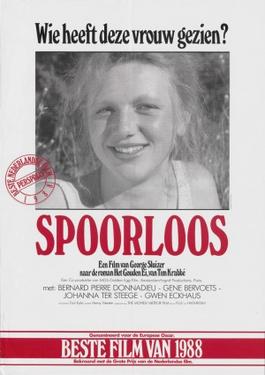
The Vanishing is a 1988 Dutch thriller film directed by George Sluizer, adapted from the novella The Golden Egg (1984) by Tim Krabbé. It stars Gene Bervoets as a man who searches obsessively for his girlfriend following her disappearance at a rest area.

Children of Paradise is a two-part French romantic drama film by Marcel Carné, produced under war conditions in 1943, 1944, and early 1945 in both Vichy France and Occupied France. Set in the theatrical world of 1830s Paris, it tells the story of a courtesan and four men — a mime, an actor, a criminal and an aristocrat — who love her in entirely different ways.
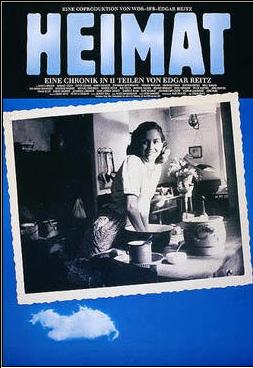
Heimat is a series of films written and directed by Edgar Reitz about life in Germany from the 1840s to 2000 through the eyes of a family from the Hunsrück area of the Rhineland-Palatinate. The family's personal and domestic life is set against the backdrop of wider social and political events. The combined length of the 5 films — broken into 32 episodes — is 59 hours and 32 minutes, making it one of the longest series of feature-length films in cinema history.

Esther (Etty) Hillesum was a Dutch Jewish author of confessional letters and diaries which describe both her religious awakening and the persecutions of Jewish people in Amsterdam during the German occupation. In 1943, she was deported and murdered in the Auschwitz concentration camp.

Leon de Winter is a Dutch writer and columnist.

I Don't Kiss is a 1991 French drama film directed by André Téchiné, starring Manuel Blanc, Emmanuelle Béart and Philippe Noiret. The plot follows a young man who leaves his provincial home in the Pyrenees, going to Paris, hoping to become an actor. A promising beginning is followed by disillusionment and he ends on the street as a prostitute. The film is a grim, melancholic portrait of a young man searching and failing to find meaning in his life. The film had a total of 472,187 admissions in France.

The Vel' d'Hiv' Roundup was a mass arrest of Jewish families by French police and gendarmes at the behest of the German authorities, that took place in Paris on 16–17 July 1942. The roundup was one of several aimed at eradicating the Jewish population in France, both in the occupied zone and in the free zone that took place in 1942, as part of Opération Vent printanier. Planned by René Bousquet, Louis Darquier de Pellepoix, Theodor Dannecker and Helmut Knochen; It was the largest French deportation of Jews during the Holocaust.
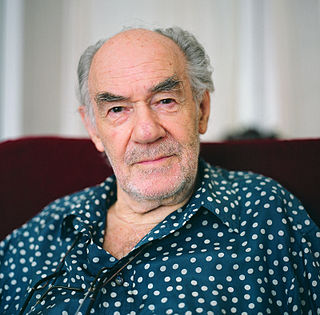
George Sluizer was a French-born Dutch filmmaker whose credits included features as well as documentary films.

Dick Hein "Derek" de Lint is a Dutch film and television actor, known for playing the role of Derek Rayne in Poltergeist: The Legacy.

The Mémorial des Martyrs de la Déportation is a memorial to the 200,000 people who were deported from Vichy France to the Nazi concentration camps during World War II. It is located in Paris, France, on the site of a former morgue, underground behind Notre Dame on Île de la Cité. It was designed by French modernist architect Georges-Henri Pingusson and was inaugurated by Charles de Gaulle in 1962.

La Vie de bohème is a 1992 tragicomedy film directed by Aki Kaurismäki and starring Matti Pellonpää, Évelyne Didi and André Wilms. Kaurismäki's screenplay for the film was loosely based on Henri Murger's influential 1851 novel Scènes de la vie de bohème which has spawned several on-screen adaptations as well as plays and operas, the most notable being Giacomo Puccini's 1896 La bohème.
Rudolf van den Berg is a Dutch writer and director.

The Virtuous Scoundrel, is a 1953 French comedy drama film directed and written by Sacha Guitry and starring Michel Simon, Marguerite Pierry and Laurence Badie. It was shot at Photosonor Studios in Paris and on location in the city. The film's sets were designed by the art director Aimé Bazin.

Ivo van Hove is a Belgian theatre director known as the artistic director of Toneelgroep Amsterdam in the Netherlands and for his Off-Broadway avant-garde experimental theatre productions. On Broadway, he has directed revival productions of Arthur Miller's A View from the Bridge, and The Crucible, Lee Hall's Network in 2018, and Leonard Bernstein and Stephen Sondheim's West Side Story in 2020. Among his numerous awards he has received a Tony Award and a Laurence Olivier Award for A View from the Bridge. He was made a Knight of the Ordre des Arts et des Lettres in France in 2004, and a Commander in the Order of the Crown in 2016.
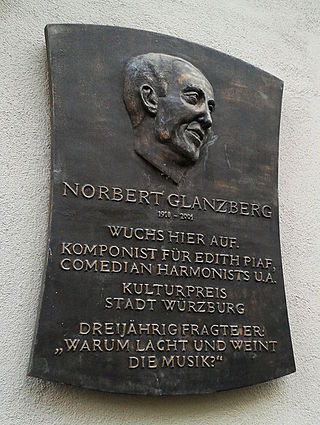
Norbert Glanzberg was a Galician-born French composer. Mostly a composer of film music and songs, he was also notable for some famous songs of Édith Piaf.
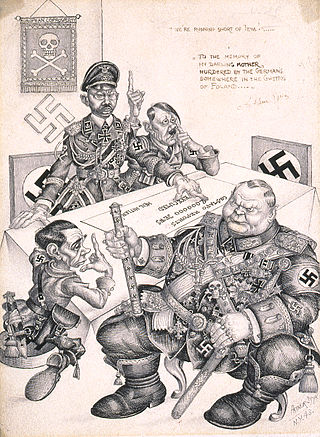
There are several major aspects of humor related to the Holocaust: humor of the Jews in Nazi Germany and in Nazi concentration and extermination camps, a specific kind of "gallows humor"; German humor on the subject during the Nazi era; the appropriateness of this kind of off-color humor in modern times; modern anti-Semitic sick humor.

















